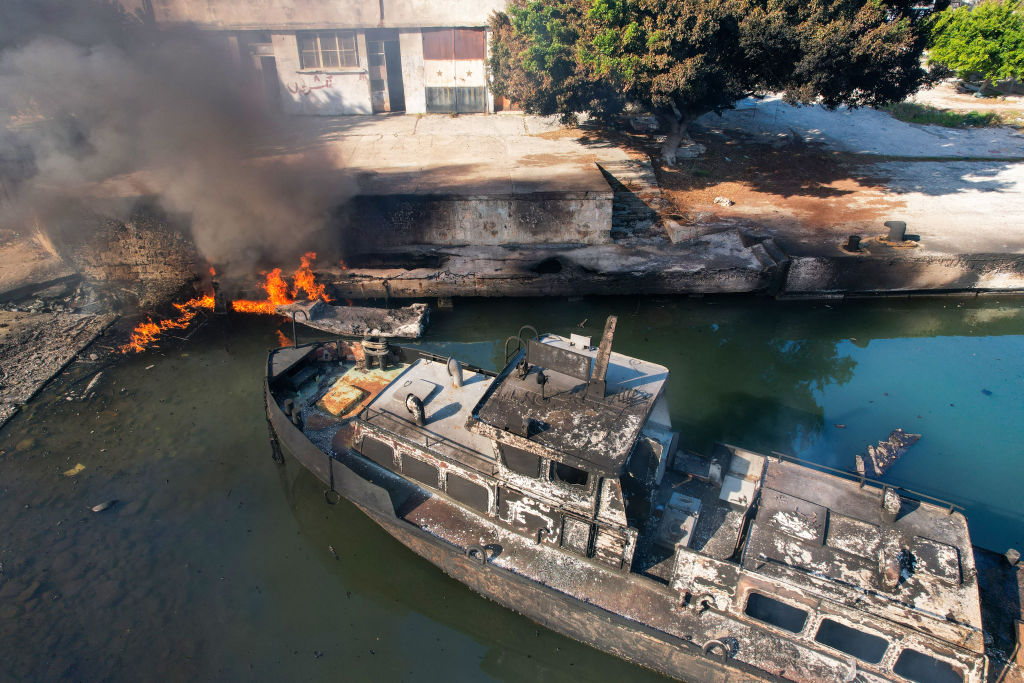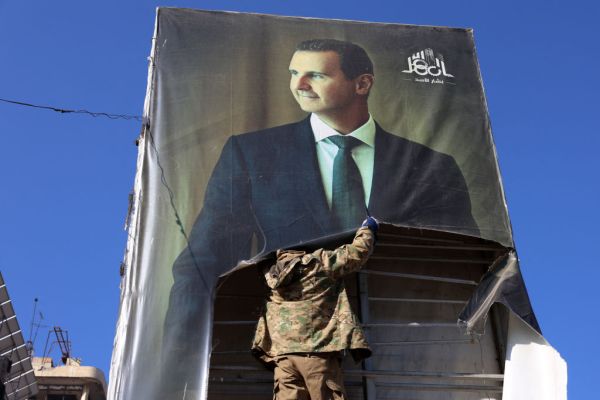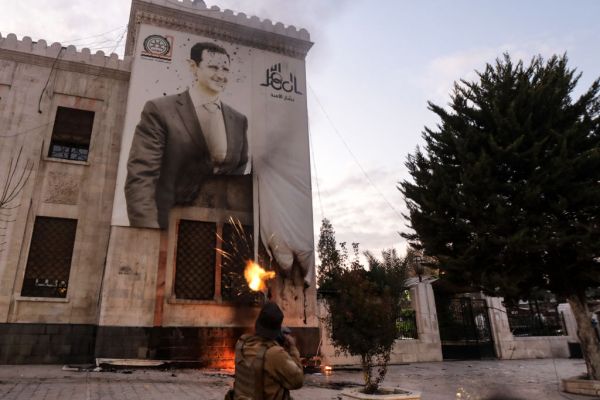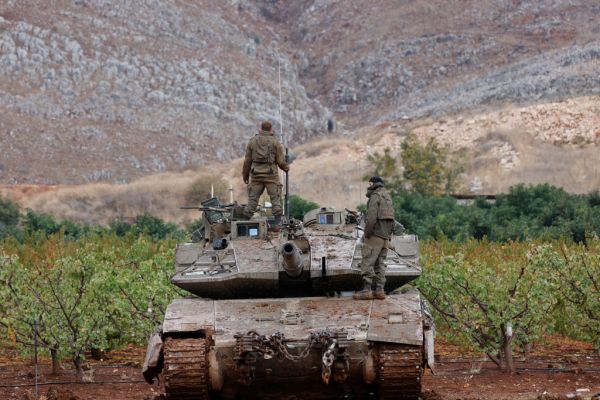As rebels stormed the Syrian capital of Damascus over the weekend, they destroyed symbols of the Assad regime’s five-decade rule. Among them: a poster featuring the images of slain Iranian and Hezbollah leaders, whose forces propped up one of the world’s most repressive dictatorships through more than a decade of civil war.
The collapse of Syria’s government is the latest in a series of blows to Iran’s regional standing, and one that Israel played no small role in bringing about. Between its military victory over Hezbollah and its aerial attacks on Iran, Israel’s maneuvers left the Tehran-allied regime of President Bashar al-Assad vulnerable to attacking opposition forces, which took just 11 days to force the longtime sovereign to flee the country.
But the rapid rebel takeover comes with its own set of challenges for Israel. Syria’s new de facto authorities are led by a Sunni Islamist group with extremist origins, Hayat Tahrir al-Sham (HTS), and represent a dangerous unknown. And as the coalition of opposition fighters seeks to solidify its hold on the country, the political turmoil risks opening the door for the resurgence of terrorist groups like al-Qaeda and the Islamic State, which—despite being adversaries of the leading rebel factions—will seek to capitalize the chaotic situation.
With its jihadist roots, the HTS is a U.S.-designated terrorist organization. Its leader, Abu Mohammad Al-Julani, has a $10 million U.S. bounty on his head. And although the militia broke ties with ISIS, it was largely due to internal power struggles rather than doctrinal differences, said Eyal Zisser, an expert on Syria and vice rector of Tel Aviv University. “They say nice things, but it’s still an Islamic approach toward running the state,” Zisser told The Dispatch. “People expect democracy. I don’t think that’s what they have in mind. We will have to wait and see.”
Bracing for chaos on its northeastern border, Israel struck hundreds of targets to prevent Syrian military assets from falling into rebel hands. The Israel Defense Forces (IDF) assessed Tuesday that the campaign had destroyed some 70 percent of the fallen Syrian army’s capabilities, including long-range missile caches, military aircraft, and naval vessels docked at the ports of Al-Bayda and Latakia. Israeli fighter jets also hit sites containing chemical weapons, which the Assad regime used against the Syrian people and retained despite a 2014 agreement requiring it to destroy its stockpiles of the outlawed agents.
The aerial assault accompanied a ground maneuver, as Israeli troops pushed into the 155-square-mile buffer zone separating Israel and Syria for the first time in 50 years. In what the military described as a temporary defensive measure, Israeli special forces captured the demilitarized area—which includes the Syrian side of Mount Hermon, the country’s highest peak—without resistance.
“The collapse of the Assad regime, the tyranny in Damascus, offers great opportunity but also is fraught with significant dangers,” Israeli Prime Minister Benjamin Netanyahu said from the Syrian border Sunday, taking credit for the dictatorship’s fall. Israel’s recent military triumphs over Hezbollah and Iran “set off a chain reaction of all those who want to free themselves from this tyranny and its oppression,” he added.
And indeed, Assad had long relied on Iran and Iranian-backed groups like Hezbollah to shore up his unpopular rule. The opposition strongholds that celebrated following Hezbollah leader Hassan Nasrallah’s death in September were the same ones from which the rebels launched their assault late last month. With Hezbollah degraded after a costly war with the IDF, and its backer Iran preoccupied following a direct confrontation with Israel, the rebels saw an ideal time to strike.
Assad’s fall casts further doubt on the efficacy of Iran’s “Axis of Resistance” strategy—a multibillion-dollar scheme to fund, arm, and train likeminded actors across the region to carry out attacks—and brings the Islamic Republic to its weakest point in decades. With the takeover of Syria by Sunni groups, for example, Iran has likely lost the ability to transfer weapons to Lebanon through Syrian territory as Hezbollah seeks to recover its arsenal after Israeli attacks.
Iran has reportedly made quiet diplomatic overtures to the new leadership in Damascus, but the effort is unlikely to receive a friendly reception. The rebels have long viewed Tehran as synonymous with the dictatorship it helped to stay in power through a brutal, protracted civil war. In an interview with CNN last week, al-Julani explicitly identified Iran as the outside power responsible for keeping Assad in power.
“Will Abu Mohammad al-Julani try to fight the IDF for control over the Golan Heights? That would probably be one of the stupidest things that they could possibly do.”
Steven A. Cook
With the rebel takeover, a new foreign actor has emerged as a major power broker in Damascus: Turkey. Both the HTS and the Syrian National Army—another opposition group behind the offensive—have varying degrees of Turkish backing, giving Ankara sway in a country bordering Israel. Turkish President Recep Tayyip Erdoğan has broken from Israel in recent years, particularly so after the start of the war against Hamas in Gaza. At one point, Erdoğan described Netanyahu as “worse than Hitler.”
But a direct confrontation between Israel and NATO ally Turkey remains unlikely despite the bellicose rhetoric, and Jerusalem may see a Turkish vassal state as preferable to the chaos that could unfold should the HTS decide to lead Syria down the path of extremism. Although the Islamic fundamentalist group has made public efforts to moderate—calling on its fighters to respect minorities, including Kurds, Alawites, and Christians—how it plans to govern the ethnically and religiously diverse country remains to be seen.
After Assad’s ouster ended a longtime understanding with the Syrian government over control of the Golan Heights, Israeli officials now fear the territory could become a flashpoint with Syria’s new sovereigns. The Israeli army captured a large portion of the plateau area in the 1967 Six-Day War and annexed it in 1981, with the U.S. recognizing Israeli sovereignty over the territory in 2019.
Al-Julani, whose self-assigned name means “of the Golan,” claims to trace his family’s heritage to the disputed territory, raising concerns that he may try to bring the issue back to the fore. But at least for now, as different rebel factions vie for influence in post-Assad Syria, the HTS leader may be reluctant to pick a fight with the Middle East’s predominant military power. Syria “isn’t ready to enter wars and has no intentions to enter wars in the future,” al-Julani said this week.
“Will Abu Mohammad al-Julani try to fight the IDF for control over the Golan Heights? That would probably be one of the stupidest things that they could possibly do,” Steven A. Cook, a Middle East expert at the Council on Foreign Relations, told The Dispatch. “Everybody says he’s this very smart guy—if he is, he’d stay away from that issue and for a good while, because he’s got bigger problems in terms of trying to consolidate power in a deeply fragmented country.”
But it remains unclear whether the HTS and its allies have sufficient arms or manpower to tamp down on extremism emanating from groups like ISIS and al-Qaeda, which will likely attempt to make a resurgence during the period of instability.
The U.S. carried out a series of airstrikes against ISIS positions over the weekend, vowing to prevent the terrorist organization from taking advantage of the turbulent situation. But there’s fear that President-elect Donald Trump might try to distance Washington from Syria at a time when the threat of jihadist violence is on the rise. “Syria is a mess, but is not our friend, & THE UNITED STATES SHOULD HAVE NOTHING TO DO WITH IT,” Trump wrote on Truth Social on Saturday. “THIS IS NOT OUR FIGHT. LET IT PLAY OUT. DO NOT GET INVOLVED!”
The statement could simply signal a reluctance to involve the U.S. in deciding the shape of Syria’s next government, but it may also indicate Trump’s desire to withdraw the some 900 U.S. troops currently stationed in the country to fight ISIS. If so, the vacuum could spell trouble for Israel and other American allies, including Kurdish forces, who fight alongside the U.S. troops and have already been targeted by the advancing Turkish-backed rebels.
“Trump wanted to withdraw from Syria three times during his first term,” Cook said. “The American mission there is now more urgent than it was during his first term because of the breakdown of the regime and the possibility of the return of the Islamic State and al-Qaeda.”










Please note that we at The Dispatch hold ourselves, our work, and our commenters to a higher standard than other places on the internet. We welcome comments that foster genuine debate or discussion—including comments critical of us or our work—but responses that include ad hominem attacks on fellow Dispatch members or are intended to stoke fear and anger may be moderated.
With your membership, you only have the ability to comment on The Morning Dispatch articles. Consider upgrading to join the conversation everywhere.